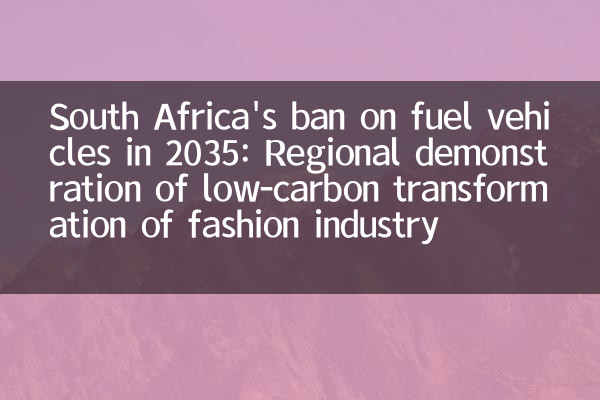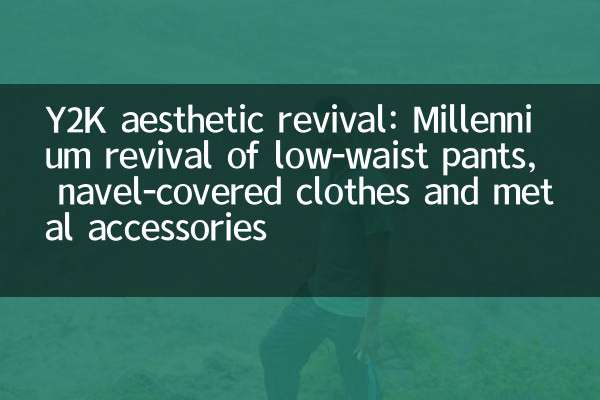South Africa's ban on fuel vehicles in 2035: Regional demonstration of low-carbon transformation of fashion industry
Recently, the South African government announced that it will completely ban the sale of fuel vehicles by 2035, becoming the first country in Africa to clarify the timetable for the elimination of fuel vehicles. This policy not only has a profound impact on the low-carbon transformation in the global transportation field, but also provides a regional demonstration for the sustainable development of the fashion industry. This article will analyze the implications of South Africa's ban on burning policies on the low-carbon transformation of the fashion industry based on the hot topics on the Internet in the past 10 days, and display related trends through structured data.
1. The background of South Africa's ban on burning is echoing global hot spots

In the past 10 days, among the hot topics on social media around the world, the #ClimateAction and #SustainableFashion tags ranked among the top in environmental protection topics with discussions of 12 million and 8.6 million respectively. South Africa announced a ban on burning at this time, which resonated with the following global trends:
| Hot areas | Related Events | Social Media Hot Index |
|---|---|---|
| Transportation emission reduction | EU passes fuel vehicle ban 2035 | 9.2/10 |
| Fashion Industry | Kering Group releases 2025 recycled materials roadmap | 8.7/10 |
| Regional Policy | South Africa's New Energy Subsidy Act passed | 7.9/10 |
2. Three major data dimensions of low-carbon transformation of the fashion industry
As the world's seventh largest clothing exporter, South Africa's policy shift will directly affect the carbon emission structure of the fashion supply chain. Industry data in the past 10 days show:
| Metric Category | Current value | 2035 goals | Compound annual growth rate |
|---|---|---|---|
| The proportion of new energy logistics | 12% | 65% | 18% |
| Recycled material usage rate | 28% | 75% | 13% |
| Coverage ratio of carbon footprint traceability system | 41% | 90% | 11% |
3. Specific manifestations of regional demonstration effects
South African policies are giving birth to a new model of cooperation in the fashion industry. Key cooperation reached in the past week include:
1.Cape Town Green Textile Park: Joining 12 brands including H&M to establish Africa's first zero-carbon production base, with an estimated 37% reduction in supply chain transportation emissions
2.Solar Printing and Dyeing Technology Alliance: Led by the South African Cotton Spinning Association, the photovoltaic direct supply system is used to reduce energy consumption in the printing and dyeing link by 52%.
3.Cross-border recycling network: The waste textile recycling system covering 6 countries including Zambia has increased the material recycling rate to 2.3 times the industry average
4. The development path that coexists with challenges and opportunities
Despite the broad prospects, there are still significant bottlenecks in the transformation process. The latest industry survey shows:
| Challenge Type | Current impact degree | Solution maturity |
|---|---|---|
| Infrastructure gap | 68% of companies mentioned | 45% |
| Shortage of skilled workers | 57% of companies mentioned | 62% |
| Short-term cost pressure | 82% of companies mentioned | 71% |
5. Inspiration to Chinese companies
As South Africa's largest trading partner, China can focus on the fashion industry:
1.New energy logistics cooperation: BYD South Africa electric vehicle factory has started customizing transportation vehicles for local clothing companies
2.Technical standard output: The low-carbon certification system released by the China Textile Industry Federation is being adopted by South African companies
3.Circular Economy Investment: The recycled fiber project invested by Shandong Ruyi Group has become the first batch of beneficiary projects in South Africa's policy
South Africa’s practice shows that regional policy leverage can effectively accelerate the low-carbon transformation of the industry. As the 2035 node approaches, the fashion industry may witness more innovative models moving from the African continent to the world.

check the details

check the details